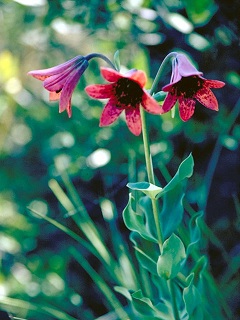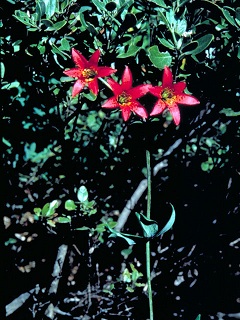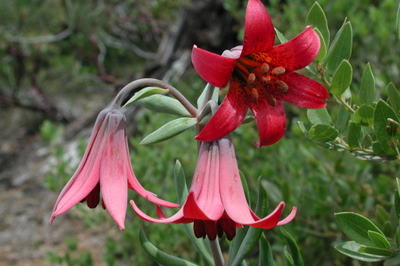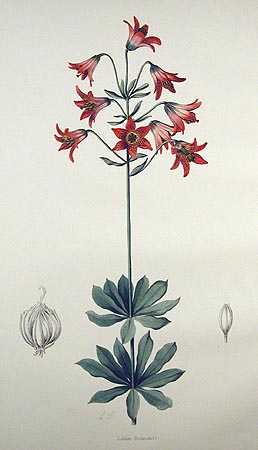|
|
|
Hansen's Northwest Native Plant Database |
|
|
|
Lilium bolanderi (Bolander's Lily)
Photo credit: Mrs. W. D. Bradsford |
 |
||||||||||||||||||||||||||||||
| This northwest native lily, commonly called Bolander's Lily, is perfect for the wildlife garden. Allen's and Rufous Hummingbirds are strongly attracted to the beautiful red trumpet shaped flowers which come on a bit earlier than most other bulbous lilies native to the Pacific northwest. This is a big plus because the hummers mark the garden as a good place to visit before the other lilies grab their attention. If the garden continues to provide the neccessary sources of nectar for these quick little birds, they will likely tell all their friends to join them. | |||||||||||||||||||||||||||||||
| True to natural lily
form, the leaves circle the stem at intervals along its length, finally
petering out near the flower buds. Each stem will have up to nine large
flowers which have 6 tepals marked with yellow to purple to darker red. A very community plant, Bolander's often hybridizes with other lilies in the neighborhood producing an ever-changing array of unusual and nontheless beautiful flowers that can be enjoyed in the garden or cut for arrangements. Of course, this unlimited variation of bloom occurs because of the active pollination provided by the hummers. Considered rare. Photo credit: Mrs. W. D. Bradsford |
 |
||||||||||||||||||||||||||||||
| For a short comparison of northwest native lilies, click here. | |||||||||||||||||||||||||||||||
|
The USDA PLANTS database under Wetland Indicator Status has this announcement: NOTE: On June 1, 2012, the 2012 National Wetland Plant List superseded the information below (see Federal Register, May 9, 2012, 77(90): 27210-27214[https://federalregister.gov/a/2012-11176]). For updated wetland information about this species, see the latest wetland list. |
 |
||||||||||||||||||||||||||||||
|
Thanks to the following resources:
|
 |
||||||||||||||||||||||||||||||
|